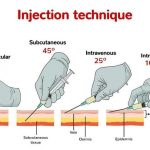1 Month Lipotropic Injections Results

Lipotropic injections, also known as lipotropic shots or lipotropic cocktails, are a type of medical treatment often used for weight loss and fat metabolism. They typically contain a combination of amino acids, vitamins, and other nutrients that are believed to enhance the breakdown and removal of fat from the liver.
The term “lipotropic” refers to substances that help the body metabolize fat. Some common ingredients found in lipotropic injections include:
1. Methionine: An essential amino acid that aids in the breakdown of fats and helps prevent the buildup of fatty deposits in the liver.
2. Inositol: A type of B-vitamin that supports the metabolism of fats and helps with the redistribution of body fat.
3. Choline: Another B-vitamin that plays a role in fat metabolism and liver function. It helps transport fats out of the liver and prevents the accumulation of fat in the liver.
4. B-vitamins: These include vitamins B12, B6, and B complex, which are often added to lipotropic injections to support overall energy production and metabolism.
Lipotropic injections are typically administered as intramuscular injections, often in the thigh or buttock, by a healthcare professional. They are usually given once or twice a week, depending on the individual’s needs and the specific formulation used.
Historical Background
The history of lipotropic injections can be traced back to the mid-20th century. Lipotropic compounds, such as methionine, inositol, and choline, were first identified for their role in fat metabolism and liver health.
In the 1950s and 1960s, medical professionals began exploring the use of lipotropic injections as a treatment for various conditions related to liver function and fat metabolism. The injections were primarily used to help patients with liver disorders, such as fatty liver disease and alcohol-related liver damage.
Over time, lipotropic injections gained popularity for their potential benefits in weight loss and body composition. It was believed that the combination of lipotropic compounds, along with other nutrients like B-vitamins, could enhance fat breakdown, increase energy levels, and support weight loss efforts.
Lipotropic injections became particularly popular in certain weight loss clinics and wellness centers. They were often marketed as a quick and effective way to boost metabolism, burn fat, and achieve weight loss goals. However, it’s important to note that the effectiveness of lipotropic injections for weight loss is still a subject of debate. While some individuals may experience positive results, the scientific evidence supporting their use as a standalone weight loss treatment is limited.
How quickly does lipotropic injections produce results?
The speed at which lipotropic injections produce results can vary from person to person. It’s important to note that lipotropic injections are not a magical solution for immediate weight loss. They are typically used as part of a comprehensive weight management plan that includes a healthy diet and regular exercise.
The potential benefits of lipotropic injections may include enhanced fat metabolism, improved liver function, and increased energy levels. Some individuals may notice improvements in these areas within a few weeks of starting the injections, while others may take longer to see noticeable changes.
It’s essential to have realistic expectations when using lipotropic injections for weight loss. They are not a quick fix and should be viewed as a complementary component of an overall lifestyle approach to weight management.
Furthermore, the effectiveness of lipotropic injections for weight loss can vary depending on several factors, including an individual’s starting weight, body composition, metabolism, and adherence to a healthy lifestyle. Sustainable and long-term weight loss is typically achieved through gradual changes in diet, exercise habits, and overall lifestyle.
How many lipotropic injections are needed to see results?
Lipotropic injections are typically administered once or twice a week, depending on the individual’s needs and the specific formulation used. It’s important to understand that lipotropic injections are not a standalone solution for weight loss and should be used as part of a comprehensive weight management plan.
In terms of results, some individuals may start to notice improvements in fat metabolism, energy levels, and body composition within a few weeks of starting lipotropic injections. However, it’s important to have realistic expectations and understand that sustainable weight loss and overall health improvements require consistent effort over time.
The number of injections needed to see results can vary, and it’s best to work closely with a healthcare professional who can monitor your progress and make adjustments to your treatment plan as needed. They can provide personalized guidance based on your individual needs and help determine the most appropriate duration and frequency of lipotropic injections for you.
How much weight can you lose with lipotropic injections?
Some individuals may experience modest weight loss while using lipotropic injections, typically in the range of 1-2 pounds per week. However, it’s important to note that weight loss results can vary, and sustained weight loss typically requires consistent effort over time.
However, the amount of weight loss achievable with lipotropic injections can vary significantly from person to person. It’s important to note that lipotropic injections are not a standalone weight loss solution. They are typically used as part of a comprehensive weight management plan that includes a healthy diet, regular exercise, and lifestyle modifications.
The primary role of lipotropic injections is to support fat metabolism and liver function, which can indirectly contribute to weight loss. However, the extent of weight loss will depend on various factors, including an individual’s starting weight, body composition, metabolism, adherence to a healthy lifestyle, and overall health.
What does lipotropic injection results look like after one month?
The results of lipotropic injections after one month can vary from person to person. It’s important to note that individual responses to lipotropic injections can depend on various factors such as starting weight, body composition, metabolism, adherence to a healthy lifestyle, and overall health.
Some individuals may experience noticeable changes within a month of starting lipotropic injections, while others may see more gradual progress. Potential results after one month may include:
1. Enhanced fat metabolism: Lipotropic compounds in the injections are believed to support the breakdown and metabolism of fats. As a result, some individuals may experience improved fat metabolism, which could lead to a reduction in body fat over time.
2. Increased energy levels: Lipotropic injections often include B-vitamins, which are involved in energy production. Some people may experience an increase in energy levels, which can contribute to improved physical activity and overall well-being.
3. Improved liver health: Lipotropic compounds like choline help support liver function and prevent the buildup of fat in the liver. After one month, individuals with liver-related conditions may see improvements in liver health indicators, such as decreased liver enzyme levels.
4. Body composition changes: While lipotropic injections alone are not likely to result in significant weight loss, they may contribute to changes in body composition. This means that even if the scale doesn’t show a significant decrease in weight, there may be improvements in body fat percentage, muscle tone, and overall body shape.
It’s important to remember that lipotropic injections are not a magic solution for weight loss, and results can vary. Sustainable and long-term weight management requires a holistic approach that includes a balanced diet, regular exercise, and lifestyle modifications.
Before considering lipotropic injections or any other weight loss intervention, it’s always advisable to consult with a healthcare professional who can provide personalized advice based on your specific needs and medical history. They can help monitor your progress and make adjustments to your treatment plan as needed.
Side effects of lipotropic injections
Lipotropic injections are generally considered safe when administered by a healthcare professional. However, like any medical treatment, they can carry potential side effects. Some possible side effects of lipotropic injections may include:
- Injection site reactions: Mild pain, redness, swelling, or bruising at the injection site can occur. These reactions are usually temporary and resolve on their own.
- Allergic reactions: In rare cases, some individuals may experience an allergic reaction to the ingredients in the lipotropic injections. Symptoms of an allergic reaction can include rash, itching, swelling, dizziness, or difficulty breathing. If you experience these symptoms, seek immediate medical attention.
- Digestive disturbances: Some people may experience gastrointestinal side effects such as nausea, diarrhea, or upset stomach. These side effects are typically mild and temporary.
- Headache or dizziness: Occasionally, individuals may experience headaches or dizziness after receiving lipotropic injections. These symptoms are usually temporary and resolve on their own.
- Hormonal imbalances: There is a theoretical concern that excessive or prolonged use of lipotropic injections may disrupt hormone balance. However, more research is needed to fully understand the potential long-term effects.
It’s important to remember that the occurrence and severity of side effects can vary from person to person. If you experience any unusual or persistent side effects after receiving lipotropic injections, it is advisable to contact your healthcare provider.
Before starting any treatment, including lipotropic injections, it is crucial to discuss your medical history and any underlying health conditions with your healthcare provider. They can help determine if lipotropic injections are appropriate for you and monitor your response to the treatment.





